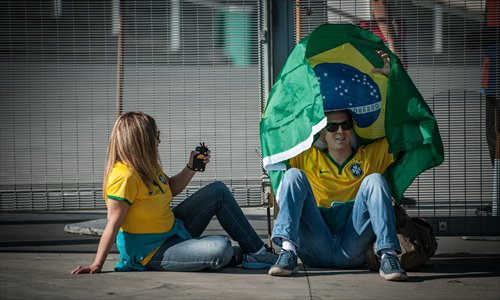HOME >> SPORTS
Feds probed over illegal ticketing
Source:AFP - Reuters Published: 2014-7-3 21:48:02
Ronaldinho’s brother Assis to be questioned

Brazilian fans cheer their team outside the Mineirao stadium before the FIFA World Cup Round of 16 match between Brazil and Chile in Belo Horizonte on Saturday (Brazilian time). Photo: AFP
Brazilian authorities investigated Wednesday whether members of the Brazilian, Argentine and Spanish soccer federations were involved in the illegal sale of World Cup tickets after police dismantled a scalping gang.
The brother and agent of Brazilian soccer star Ronaldinho, Roberto de Assis Moreira, will be questioned in the case, though he is not under investigation, said Marcos Kac, the Rio de Janeiro prosecutor in charge of the investigation.
Police arrested 11 people on Tuesday accused of selling tickets that may have been obtained through a contact at FIFA, the world soccer governing body, authorities said.
The tickets were the type handed out by FIFA to sponsors, soccer federations, players and non-governmental organizations.
"Ronaldinho's brother told some of his friends that they could buy tickets through this system," Kac said. "If we see that he has any relationship with this group, if we see that he collaborated in any way, then he would be involved. For now, he isn't."
The ticket ring was led by an Algerian suspect identified as Mohamadou Lamine Fofana, who had been under investigation for three months, he said.
Rio newspaper O Dia said it had access to a police wiretap of a conversation between Lamine and Ronaldinho's brother taped on June 17.
In the discussion, Assis asks Lamine if he received a call from one of his friends who wanted a ticket.
Lamine suggested he sold mainly VIP tickets.
Assis also tells Lamine he is trying to negotiate his famous brother's possible transfer to a club in Qatar for "10 million," without specifying the currency.
Lamine offers to discuss the possible deal with officials in Qatar and Dubai.
Ronaldinho, a 2002 World Cup winner who was not called up to play in this year's tournament, currently plays for Brazilian side Atletico Mineiro.
Nine of the ticket ring's suspects were detained in Rio, including Lamine, and two in Sao Paulo.
"The group charged a lot of money for each game," Kac said. "It was 1,000 tickets per game, with a basic price of 1,000 euros ($1,365)."
Lamine obtained tickets that FIFA distributed to soccer federations, players, operators and companies, Kac said.
"There are suspicions that he had contacts with somebody at FIFA, but we are investigating," the official said.
Contacted by AFP, FIFA said it was awaiting detailed information from local authorities to examine the seized tickets and determine their origin before taking any action.
Some of the tickets seized were handouts for the soccer federations of Brazil, Argentina and Spain.
"This is being investigated," the prosecutor said.
The crackdown led to the closure of three travel agencies suspected of being involved in illegal game ticket sales.
Authorities have arrested dozens of illegal ticket sellers outside stadiums around the country since the tournament started on June 12.
AFP journalists saw illegal ticket sales near stadiums. On Tuesday, scalpers were selling tickets to the Argentina-Switzerland last-16 game for $1,500.
Also on Wednesday, FIFA has asked German magazine Der Spiegel to hand over all the documents it says it has regarding the claims of convicted match-fixer Wilson Raj Perumal that Cameroon players threw their World Cup Group A games.
FIFA has refused to make any comment regarding the allegations that some Cameroon players fixed the results of their three group matches, which all ended in defeat, nor would it confirm or deny it was investigating the claims.
The Cameroon FA said on Monday that it was to investigate claims of match-fixing by their players, especially the 4-0 loss to Croatia.
Posted in: Soccer